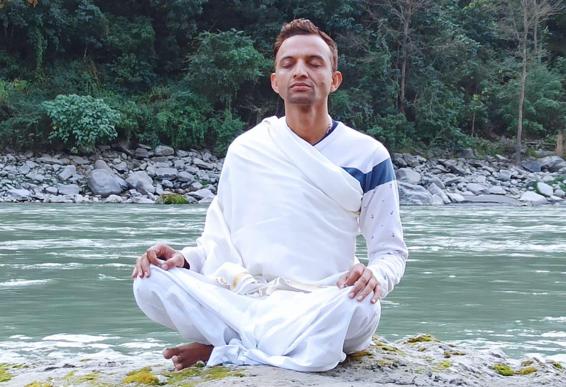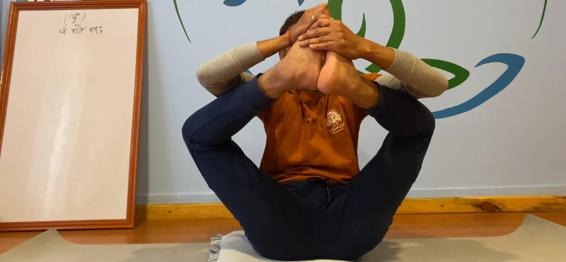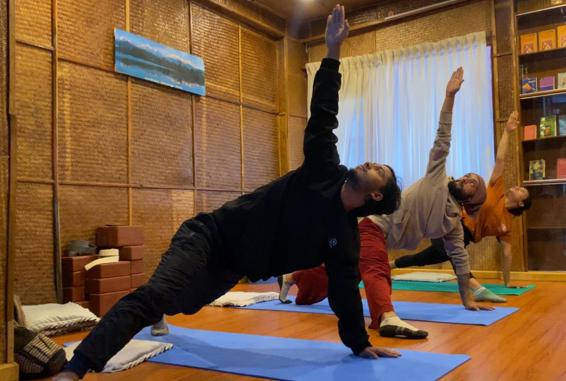1. Introduction
Yoga and meditation are ancient practices that have been used for centuries to improve physical and mental well-being in a primary level, ultimately purpose of yoga and meditation is to attain the self-realization. Both practices involve physical movement and mindfulness, and they can be done alone or in a group setting.
Yoga starts with physical practice that involves a series of postures and movements called asanas. These asanas help to improve flexibility, strength, and balance, and they can also help to reduce stress and improve overall physical health. In addition to the physical benefits, yoga also has mental benefits, as it helps to calm the mind and improve focus and concentration.
Meditation is a mental practice that involves focusing the mind on a single point of reference, such as the breath, mantra any Image of deities or seen . Meditation helps to calm the mind and reduces the stress, and it has been shown to have numerous health benefits, including reducing anxiety and depression, improving sleep, and increasing overall well-being. Opening the inner dimension of creativity and self exploration.

Both yoga and meditation can be practiced by people of all ages and fitness levels, and they can be done anywhere, at any time. There are many different styles of yoga and meditation, so it's easy to find a practice that works for you.
If you're interested in trying yoga or meditation, there are many resources available, including classes at yoga studios, online classes, and apps. It's important to find a style and teacher that resonates with you, and to listen to your body and modify the practice as needed. With regular practice, yoga and meditation can help you to improve your physical and mental well-being and lead a happier, healthier life.
At Bodhidham Yoga School and Retreat Ashram, both yoga and meditation is a regular and everyday practice. We have a special schedule for traditional rituals like puja and only serve Fresh and organic, strictly vegetarian food. Our teachers come from different specializations of yoga and are even more strict on the choice of foods and lifestyle.

2. History of Yoga and Meditation
Yoga and meditation have a long and rich history dating back thousands of years. Both practices originated in ancient India and have been passed down through the generations in various forms.
The origins of yoga can be traced
back to at least the 5th century BCE,
with the earliest written record of
the practice found in the ancient
Indian scriptures known as the
Vedas. These texts describe yoga as
a way to cultivate physical and
mental well-being and to achieve
union with the divine.
Over the centuries, yoga has evolved
and developed into many different
styles and traditions, each with its
own unique approach to the
practice. Today, yoga is practiced all
over the world and is embraced by
people of all ages and fitness levels
as a way to improve physical and mental well-being.
Meditation has a similarly long history, with roots dating back to at least the 6th century BCE. Like yoga, meditation has its origins in ancient India and has been passed down through the generations in various forms.
Meditation is an ancient practice that involves focusing the mind on a single point of reference, such as the breath, mantra, deities or scenery. There are other multiple techniques to practice meditation. It is often associated with spiritual and religious traditions, but it can also be practiced as a secular practice for the purpose of improving mental well-being and contentment.
Today, meditation is practiced all over the world and is embraced by people of all ages and from all walks of life as a way to reduce stress and improve overall well-being.

In conclusion, yoga and meditation are ancient practices with a rich history that have been passed down through the generations. Both practices have evolved over the centuries and are now embraced by people all over the world as a way to improve physical and mental well-being.
In recent years, there has been a growing body of research on the potential benefits of yoga and meditation. Both practices have been studied for their effects on physical and mental health, and the results of these studies have been promising.
One area where yoga has been studied extensively is its effects on physical health.
Research has shown that regular yoga practice can improve flexibility, strength, and balance, and it can also help to reduce stress and improve overall physical health. Yoga has also been shown to have a positive impact on conditions such as high blood pressure, heart disease, and chronic pain.

In terms of mental health, yoga has been shown to have a number of benefits. Studies have shown that regular yoga practice can reduce anxiety and depression, improve sleep, and increase overall well-being. Yoga has also been shown to improve focus and concentration and to reduce stress and fatigue.
Meditation has also been studied extensively for its effects on mental health. Research has shown that meditation can reduce anxiety and depression, improve sleep, and increase overall well-being. It has also been shown to improve focus and concentration and to reduce stress and fatigue.
In addition to its effects on physical and mental health, yoga and meditation have also been studied for their effects on overall quality of life. Studies have shown that regular practice of yoga and meditation can improve overall quality of life and lead to greater happiness and satisfaction.
Overall, modern research has provided strong evidence for the potential benefits of yoga and meditation for both physical and mental health. While more research is needed to fully understand the mechanisms behind these benefits, the results of current studies are encouraging and suggest that regular practice of these ancient practices can lead to improved physical and mental well-being.









